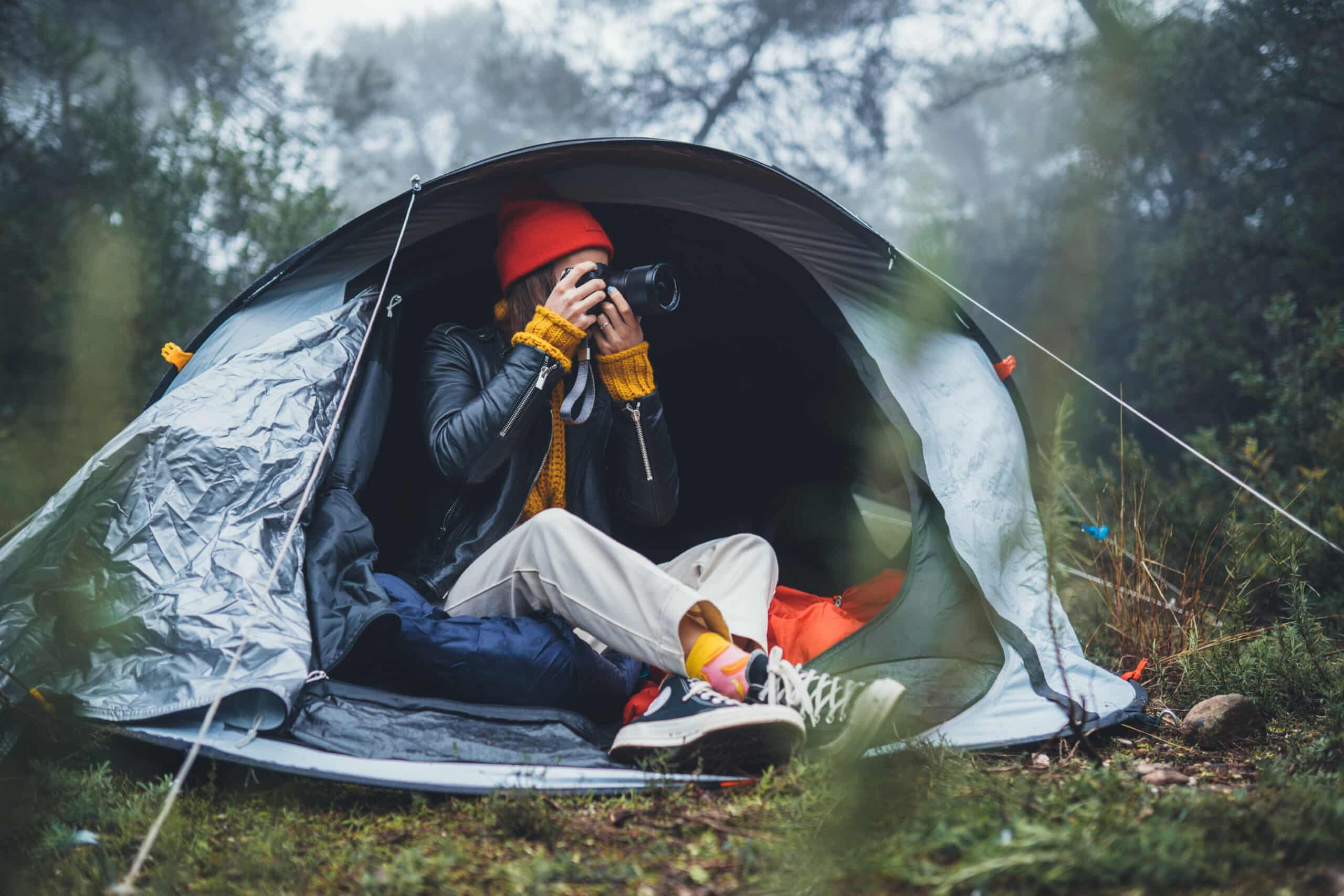What Is The Difference Between A Tent And A Canopy
Some of the links below are affiliate links. As an Amazon Associate, I earn from qualifying purchases. This means that, at zero cost to you, I will earn an affiliate commission if you click through the link and finalize a purchase.
Organizing an amazing outdoor party, event, or gathering can be a daunting task. You need to ensure that your guests or attendees are entertained, protected, and comfortable. To achieve this, there are two great options for you. You can either go for tents or canopies. Even though they are thought to be the same, and people use them interchangeably, there are some differences between both of them.
The difference between a tent and canopy is that tents are sturdier structures meant to be temporary living quarters, they also create a complete structure whereas canopies are just covering overhead and not the sides. Tents are used long term and canopies are for short term uses.
In this article, you will learn more on the uses of tent and canopy, differences between tent and canopy, and the best places to use tents or canopy.
What Is A Tent?
A tent is defined by Merriam Website dictionary as a collapsible shelter of fabric like canvas or nylon, stretched and sustained by poles and used for camping outdoors or as a temporary building.
A lot of tents are manufactured from fire-retardant materials like cotton, polyester, or nylon. They can be produced to accommodate one person or thousands of people. They can be attached to the ground with pegs and pegs, or they can be free-standing.
Tents were initially used as homes by nomadic peoples. Nowadays, the structure is mostly used in recreational camping and in events that do not need permanent shelters like traveling circuses, trade fairs, temporary military bases, and as cover for vehicles like SUVs, trucks, and others.
The demand for tents has increased due to the popularity of outdoor recreational activities, especially among people who dwell in cities. Also, there are different types of tents with their unique features and uses.
Types Of Tents
Frame Tents
They are probably the most popular event tent. They are great for outdoor events and are usually tents that are associated with rental tents. They can range from small tents to large outdoor venues that can contain hundreds of guests.
Pole Tents
This type of tent uses center and perimeter poles and stakes or anchors to remain stable. They are better for long-term use, and they are heavier than instant canopies but are still lighter than some heavy-weight canopies. Despite being heavier, they are easy to set up.
Other tent types include Dome tent, Basic ridge tent, Instant or quick-pitch tents, Tunnel tents, Inflatable tents, Tension tents, and camping tents. Frame tents and pole tents are the most popular tents among them for outdoor events and gatherings.
Features of Tents
- They are spacious and can fit any number of guests. Hence, they can be used for outdoor events like company gatherings, concerts, among others.
- Strong in harsh climatic conditions
Frame tents can be used in emergency conditions like wind, heavy rain, and hail.
Therefore, they are excellent for keeping guests in a tent protected and comfortable. - Classic event tent design
The tents provide a classic look that many companies and couples go for in their events and weddings, with dreamy tents and beautiful canvas that your guests will love.
What Is A Tent Used For?
- Tents are used for providing temporary accommodation in disaster conditions like fire, floods, and earthquakes.
- The military can use a tent as temporary sleeping quarters, temporary hospitals, security checkpoints, and dining areas.
- It can be used to serve as an extra room or extension to your house.
- It can give a beautiful shelter and ambience for your guest at events like celebrations and weddings.
- It gives versatility and flexibility during camping, cycling, or climbing mountains.
- Large tents can provide cover for weddings, exhibitions, celebrations, funerals, events, and parties.
- Tents can also be used for: Backyard parties, desert shelters, corporate events, industrial shelters, excavation covers, recreational campers, festivals, protest movements, beach cover, and hiking.
Pros of Using Tents
- They are strong and can withstand harsh weather condition.
- They can be used for big events.
- They create a beautiful ambience during weddings and other celebrations.
- They have multiple uses.
- They can be used for events that last for several days.
- They can protect your guests from harsh weather conditions.
Cons of Using Tents
- Tents are not easy to transport, set up, and organize.
- Tents are expensive.
What Is A Canopy?
A canopy refers to smaller, lightweight tents that are easily set up without much experience. They are usually hired as over-the-counter units that a customer gets and set up by themselves. Canopies are not as durable or strong as a frame tent. They are usually made of lighter vinyl material. They are comparatively less expensive to rent. They offer temporary shelter from rain and sunlight.
Even though canopies are staked to the ground for increased strength, their ropes and stakes are not meant for harsh weather conditions, mostly in areas of high winds. They are usually installed on grass or an all dirt area. They need extensive stalking to hold up the structure.
Features of Canopy
- Smaller size
Canopies are usually pop-up and are great for small groups. - Can be Easily Transported
The weight and size of canopy tents make them easily transportable. - It is comparatively cheaper than tents.
- One person can set it up.
- It is useable in light weather conditions.
Uses of Canopies
- Canopies can be used for smaller events.
- They are suitable for outdoor events with many areas and stations, small medical tents, personal outings, and outdoor markets.
- Multiple canopies can be set up together for an outdoor game or a carnival theme, or one canopy tent can serve as a rest area in an outdoor event.
- They serve as quick, comfortable shelters for small groups.
Pros of Using Canopies
- They are easy to set up.
- They are cheaper.
- They are better for small events.
Cons of Using Canopies
- They are not strong enough to withstand harsh weather conditions.
- They are not suitable for big events.
What Is The Difference Between A Tent And A Canopy?
Tents and canopies are both useful for outdoor events. However, there are some differences between them. Some of them are explained below:
Ease of Use
Canopies are more comfortable setting up, storing, and transport than tents due to their smaller size. Hence, they are ideal for smaller events
Size
In terms of size, canopies are smaller than tents. Frame tents have a large size that can accommodate almost every outdoor event. Therefore, for bigger events, frame tents are better.
Strength
This is another difference between canopies and tents. Frames are sturdier and can shelter guests from harsh weather conditions.
On the other hand, canopies are great for smaller, shorter events and cannot withstand harsh weather conditions.
Which Is Better?
In discussing the better option between canopy and tents, we have to consider several factors.
- Size of the event: If you are organizing a small event, you might opt for canopies. On the other hand, if you want to host big events, you need to opt for tents to accommodate guests for almost any kind of event you want to organize.
Tents are better for big events, while canopies are better for small events.
- Your Budget: You should also consider your budget in choosing between canopies and tents. Tents are quite pricey, and canopies are relatively cheaper. Therefore if your budget is low, you need to go for canopies. But if you have a high budget, you can opt for tents.
Canopies are cheaper than tents.
- Weather conditions: Another factor to consider here is the weather condition. If the weather is friendly, you can opt for canopies. However, if there are forecasts of impending harsh weather conditions, you should opt for tents.
Tents can withstand harsher climatic conditions than canopies.
- Duration of Event: You should also consider your event’s duration in selecting whether to go for canopies or tents. Canopies are usually for events that will not last more than a day. On the other hand, tents are for events that can last for days and even weeks. Therefore, if you are organizing a camping program, you can opt for tents. But if you are organizing a small get-together, you can opt for tents.
Tents can be used for events that span days and weeks; canopies are used for events that last for a couple of hours.
Tents are bigger and stronger. They are built for outdoor gatherings that need shelter from weather conditions.
Canopies, on the other hand, are smaller and cheaper; they are better for small events and can save you some money.

